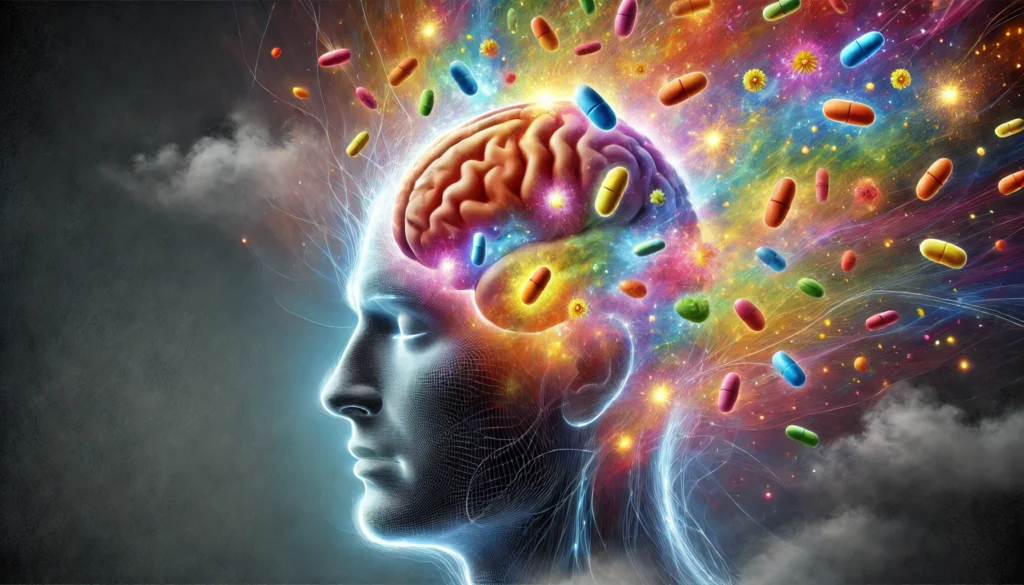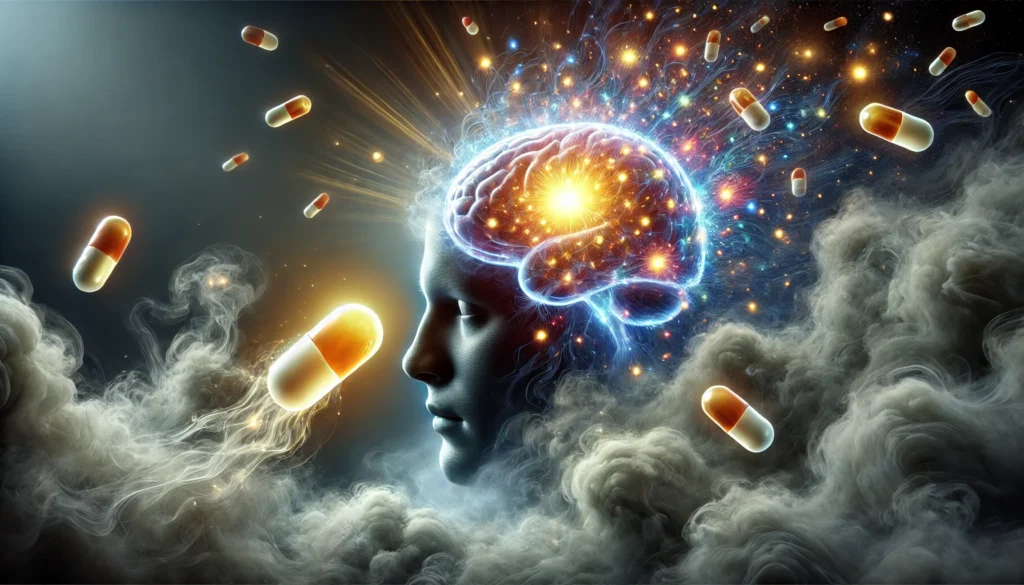Before we explore the vitamins that can help, it’s important to understand what brain fog is. Often described as a clouded consciousness, brain fog is characterized by confusion, forgetfulness, and a lack of focus and mental clarity. While it’s not a medically recognized condition, it’s a symptom of several underlying issues, including nutritional deficiencies.
You may also like: Understanding the Science Behind Lost Memory
Symptoms and Signs of Brain Fog
Brain fog manifests in various ways. You might find yourself struggling with memory lapses, feeling overwhelmed by simple tasks, or unable to concentrate on conversations. These symptoms can be frustrating and may lead to decreased productivity and motivation. It’s essential to recognize these signs early on to address them effectively.
Common Causes of Brain Fog
Brain fog can stem from numerous sources. Stress, sleep deprivation, hormonal changes, and poor diet are common culprits. Additionally, certain medications and underlying health conditions like thyroid issues or autoimmune diseases can contribute to this mental cloudiness. Identifying the root cause is the first step toward finding relief.
The Impact on Daily Life
Living with brain fog can take a toll on your personal and professional life. It can affect your decision-making abilities, relationships, and overall mental health. Understanding the impact of brain fog can motivate individuals to seek solutions and make lifestyle changes to enhance their cognitive well-being.
The Role of Vitamin Deficiencies
Various vitamin deficiencies can contribute to brain fog. A lack of essential nutrients impairs brain function and can lead to the symptoms often associated with brain fog. Let’s explore some key vitamins that are pivotal in maintaining mental clarity.
How Vitamins Affect Cognitive Function
Vitamins play a crucial role in supporting brain health. They participate in neurotransmitter synthesis, protect neurons from damage, and help maintain the structural integrity of brain cells. A deficiency in vital vitamins can disrupt these processes, leading to cognitive decline and brain fog.
Identifying Vitamin Deficiencies
Recognizing vitamin deficiencies involves understanding their symptoms. For example, fatigue, pallor, and dizziness might indicate a B12 deficiency, while muscle weakness and bone pain could suggest low vitamin D levels. Blood tests can confirm these deficiencies, guiding appropriate dietary adjustments or supplementation.
The Importance of a Balanced Diet
A diet lacking in essential nutrients can exacerbate brain fog. Incorporating a variety of fruits, vegetables, whole grains, and lean proteins ensures that your body receives the vitamins necessary for optimal brain function. A balanced diet is a foundational step in preventing and alleviating brain fog symptoms.
Vitamin D: The Sunshine Vitamin
Can Low Vitamin D Cause Brain Fog?
Vitamin D deficiency is a common issue, especially in regions with limited sunlight. Known as the “sunshine vitamin,” vitamin D plays a significant role in brain health. Research suggests that low levels of vitamin D are linked with cognitive impairment and may contribute to the feeling of brain fog. Ensuring adequate vitamin D levels, whether through sunlight exposure, diet, or supplementation, can help alleviate these symptoms.
Sources and Benefits of Vitamin D
Vitamin D can be obtained from various sources. Sunlight is the most natural provider, but dietary sources like fatty fish, fortified dairy products, and egg yolks also contribute. Supplementation may be necessary for those with limited sun exposure. Adequate vitamin D levels support not only brain health but also bone health and immune function.

Integrating Vitamin D into Daily Life
Incorporating vitamin D into your daily routine can be simple. Spend time outdoors, especially during peak sunlight hours, to naturally boost your levels. Consider vitamin D-rich foods in your meals, and if needed, discuss supplementation options with your healthcare provider to ensure you’re meeting your body’s needs.
Supplements for MS Brain Fog
For individuals with Multiple Sclerosis (MS), brain fog is a common symptom. Vitamin D has been studied for its potential benefits in MS, as it may help modulate the immune response and improve cognitive function. However, it’s crucial to consult with a healthcare provider before starting any supplementation.
Research on Vitamin D and MS
Emerging studies suggest that vitamin D may have neuroprotective properties beneficial for MS patients. These properties may help reduce the severity of brain fog by supporting nerve health and reducing inflammation. Ongoing research is vital to fully understand the extent of these benefits.
Personalized Supplementation Strategies
For those with MS or other chronic conditions, personalized supplementation strategies can be valuable. Working closely with healthcare professionals ensures that vitamin D levels are optimized based on individual health needs and environmental factors.
Vitamin B12: Vital for Cognitive Function
B12 and Brain Fog
Vitamin B12 is essential for the production of red blood cells and maintaining a healthy nervous system. A deficiency in B12 can lead to neurological changes, including memory loss, confusion, and difficulty concentrating—all hallmarks of brain fog.
Dietary Sources of B12
B12 is primarily found in animal-based foods such as meat, fish, eggs, and dairy products. Fortified cereals and plant-based milk alternatives can also provide B12 for vegetarians and vegans. Ensuring a varied diet can help maintain adequate B12 levels and support cognitive health.
Recognizing B12 Deficiency Symptoms
Symptoms of B12 deficiency extend beyond brain fog. Look out for fatigue, tingling sensations, and mood changes. Early detection and treatment are crucial to prevent irreversible neurological damage and improve mental clarity.
What Vitamin Deficiency Causes Brain Fog?
The connection between B12 deficiency and brain fog is well-documented. While dietary sources like meat, fish, and dairy provide adequate B12 for most people, vegetarians, vegans, and older adults might need to consider supplementation to maintain optimal levels.
Addressing B12 Deficiency in At-Risk Groups
Certain populations, such as older adults and those following plant-based diets, are at higher risk of B12 deficiency. Regular monitoring and appropriate supplementation can help prevent cognitive decline and maintain mental clarity in these groups.
The Role of Intramuscular B12 Injections
For individuals with severe B12 deficiency, oral supplements might not suffice. Intramuscular B12 injections can provide a direct and efficient means of replenishing B12 levels, offering a potential solution for persistent brain fog symptoms.
Other Vitamins and Nutrients
Vitamin E: The Antioxidant Powerhouse
Vitamin E is an antioxidant that protects brain cells from oxidative stress. While research is still ongoing, some studies suggest vitamin E supplementation might support cognitive health and reduce symptoms of brain fog, particularly in older adults.
The Mechanisms of Vitamin E
Vitamin E helps neutralize free radicals, preventing cellular damage in the brain. This protective function is crucial for maintaining cognitive health and reducing the risk of neurodegenerative diseases that can exacerbate brain fog.
Incorporating Vitamin E into Your Diet
Nuts, seeds, and green leafy vegetables are excellent sources of vitamin E. Including these foods in your diet can enhance your intake of this antioxidant powerhouse, supporting overall brain health and potentially alleviating brain fog symptoms.

Omega-3 Fatty Acids
Though not a vitamin, omega-3 fatty acids deserve mention for their role in brain health. These essential fats, found in fish oil, support cell membrane integrity and have anti-inflammatory properties that can enhance cognitive function and reduce brain fog.
The Benefits of Omega-3s for Brain Health
Omega-3 fatty acids, particularly EPA and DHA, are integral to brain function. They support neurotransmitter activity, improve mood, and have been linked to reduced symptoms of depression and anxiety, which can contribute to brain fog.
Sources and Supplementation of Omega-3s
Fatty fish like salmon, mackerel, and sardines are rich in omega-3s. For those who don’t consume fish, algae-based supplements offer a plant-based alternative. Ensuring adequate omega-3 intake can be a valuable strategy in combating brain fog.
Can Supplementation Cause Brain Fog?
While supplementation can be beneficial, it’s important to approach it with caution. Over-supplementation of certain vitamins and minerals can lead to adverse effects, including brain fog. It’s essential to adhere to recommended dosages and consult with a healthcare provider before beginning any new supplement regimen.
Balancing Supplement Intake
Maintaining a balance in vitamin and mineral intake is crucial. Excessive supplementation can lead to toxicity and exacerbate symptoms of brain fog. A personalized approach, guided by healthcare professionals, ensures safe and effective use of supplements.
Monitoring and Adjusting Supplement Use
Regular monitoring of nutrient levels through blood tests can help tailor supplementation strategies. Adjusting dosages based on individual needs and health status prevents potential negative effects and supports cognitive health.
Historical Context and Current Trends
The recognition of vitamins as crucial components of human health began in the early 20th century. Since then, our understanding of their role in cognitive health has grown significantly. Today, with the rise of biohacking and personalized medicine, there’s a heightened focus on optimizing vitamin intake for brain health.
The Evolution of Nutritional Science
Nutritional science has evolved dramatically, uncovering the intricate relationships between vitamins and brain function. This evolution has paved the way for targeted nutritional interventions aimed at improving cognitive health and combating brain fog.
Biohacking and Personalized Nutrition
Biohacking, the practice of using science and technology to enhance body and mind, often emphasizes personalized nutrition. By understanding individual genetic and nutritional profiles, biohackers seek to optimize vitamin intake to achieve peak cognitive performance.
Trends in Vitamin Research
Current trends in vitamin research focus on precision nutrition and the potential of vitamins to prevent and treat cognitive decline. As research continues, we anticipate more targeted and effective strategies for managing brain fog and supporting brain health.
Practical Advice for Combating Brain Fog
To mitigate brain fog, consider a multifaceted approach:
- Diet: Incorporate a balanced diet rich in fruits, vegetables, lean proteins, and whole grains. Foods like fatty fish, eggs, nuts, and leafy greens are excellent sources of brain-boosting vitamins.
Tailoring Your Diet for Cognitive Health
A diet tailored to cognitive health involves selecting nutrient-dense foods that support brain function. Prioritizing whole, unprocessed foods ensures a steady supply of essential vitamins and minerals, helping to alleviate brain fog.
- Lifestyle: Regular physical activity, adequate sleep, and stress management are vital components of maintaining cognitive health.
The Role of Exercise and Sleep
Exercise enhances blood flow to the brain, promoting neurogenesis and cognitive function. Coupled with adequate sleep, which facilitates memory consolidation and cognitive recovery, these lifestyle factors form the backbone of brain health.
- Supplements: If dietary intake is insufficient, consider supplements for vitamins D and B12, but always under the guidance of a healthcare provider.
Navigating Supplementation Safely
When dietary sources fall short, supplements can bridge the gap. However, it’s vital to approach supplementation with care, selecting high-quality products and consulting healthcare professionals to tailor regimens to individual needs.
Final Thoughts
Brain fog can be frustrating, but with the right approach, it’s possible to clear the mental cobwebs. By understanding the impact of vitamin deficiencies and integrating the right nutrients into your diet, you can improve your cognitive function and overall well-being. As always, consult with healthcare professionals to tailor the best strategy for your individual needs.
Embracing a Holistic Approach
A holistic approach to combating brain fog considers all aspects of health—diet, lifestyle, and mental well-being. By addressing each component, you can create a supportive environment for optimal cognitive function and mental clarity.

The Role of Professional Guidance
Working with healthcare professionals provides valuable insights and personalized strategies for managing brain fog. Their expertise ensures that interventions are safe, effective, and tailored to your unique health profile.
In our journey to combat brain fog, vitamins are valuable allies. Whether you’re advising clients, writing for an audience, or optimizing your own health, these insights can guide you toward a clearer, sharper mind.
Further Reading:
Important Note: The information contained in this article is for general informational purposes only, and should not be construed as health or medical advice, nor is it intended to diagnose, prevent, treat, or cure any disease or health condition. Before embarking on any diet, fitness regimen, or program of nutritional supplementation, it is advisable to consult your healthcare professional in order to determine its safety and probable efficacy in terms of your individual state of health.
Regarding Nutritional Supplements Or Other Non-Prescription Health Products: If any nutritional supplements or other non-prescription health products are mentioned in the foregoing article, any claims or statements made about them have not been evaluated by the U.S. Food and Drug Administration, and such nutritional supplements or other health products are not intended to diagnose, treat, cure, or prevent any disease.


